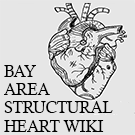ECMO: Difference between revisions
From Bay Area Structural Heart Wiki
No edit summary |
No edit summary |
||
| Line 89: | Line 89: | ||
#Clean and dress both sites | #Clean and dress both sites | ||
===Septostomy=== | |||
See [[Septostomy]] page | |||
===Antegrade Perfusion=== | |||
*Use Arrow short braided sheath on ECMO cart | |||
*Ultrasound and micro puncture used to access SFA below arterial cannula | |||
*Use double-male lure adaptor to attach sheath side-port to arterial cannula vent. | |||
<hr /> | <hr /> | ||
Approved: MM/DD | Approved: MM/DD | ||
[[Category:Procedures]] | [[Category:Procedures]] | ||
Revision as of 22:02, 30 November 2020
Daniels/Spies - Draft
Also used for Dr. Sheridan
Wires:
Open
- Amplatz SS 1cm tip
- Cordis 150J
Standby
- Amplatz Extra Stiff
- Glidewire
Sheaths:
Open
- 8fr Pinnacle
ECMO cart:
Open
- ECMO instruments
- 16/18 Coons dilators
- 20/22 Coons Dilators
- Arterial vented cannula - Normally 16fr.
- Venous cannula - Normally 21fr.
- Irrigation bulb syringe
- ”Carrot tops” Orange vessel tourniquets
Standby
- Alternative sizes of cannulas
- Arrow 5 and 6fr braided sheaths for antegrade bypass
- Male Male luer adapter for antegrade bypass
Misc Supplies:
Open
- Micropuncture
- Probe cover
- 25g lido needle (Daniels)
- (2) Perclose
- (2) 0 Silk or Ethibond (Not for Sheridan)
- (2) 2-0 Prolene (Open 4 for Dr. Sheridan)
- (2) “Suture Locks”
- (2) Biopatch
* Be prepared to perform a septostomy post ECMO implant *
Egrie
- Substitute Vascular dilator kit for Coons dilators
- Substitute white nylon and Martin free needles for securement suture
Procedure
- Table setup:
- Separate Coons dilators. We use the 16 and 20 French. The other can go to the back table for standby. This eliminates confusion during the rapid access portion of the procedure.
- Arrange instruments. Have tubing clamps and heavy trauma shears immediately available to the physician. Needle driver and Mayo scissors are used for suturing after cannula are in place.
- Arterial access with ultrasound and micro puncture (Usually left groin)
- Short sheath wire and 8fr. dilator
- Pre-close
- Stiff wire inserted
- 16fr. Coons dilator
- Arterial (Aortic) Cannula inserted
- Pull wire and dilator while MD clamps
- Venous access (Daniels uses big needle and ultrasound)(Usually right groin)
- Stiff wire inserted (Usually no pre-close)
- 20fr. Coons dilator
- Venous cannula inserted (Hold dilator in place in cannula while advancing)
- Pull wire and dilator while MD clamps
- CST hands over sterile portion of circuit
- Clamp circuit while MD cuts tubing
- Assist MD in cutting and untwisting circuit
- Use irrigation syringe to assist MD in air-free connection between circuit and cannula
- 0-Prolene used to create purse-string closures around each cannula
- 0-Ethibond used to secure cannulas to skin
- Suture-locks used ~6” down tubing to further secure circuit
- Carrot-top cut to ~4” used to protect Perclose sutures from being pulled or cut
- Bio-patches placed
- Clean and dress both sites
Septostomy
See Septostomy page
Antegrade Perfusion
- Use Arrow short braided sheath on ECMO cart
- Ultrasound and micro puncture used to access SFA below arterial cannula
- Use double-male lure adaptor to attach sheath side-port to arterial cannula vent.
Approved: MM/DD
